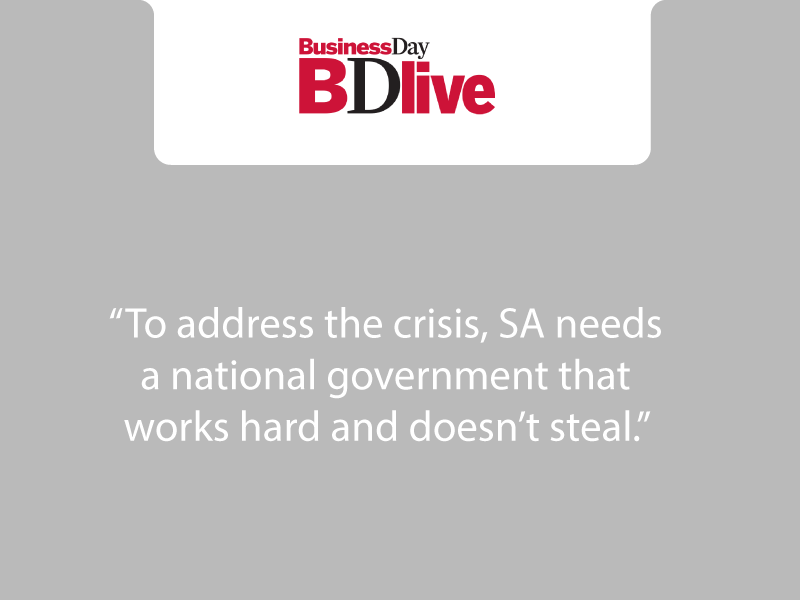 There will be no jobs without inclusive growth, and without rethinking our industrial policy and approach to labour- especially ‘unskilled’ work
There will be no jobs without inclusive growth, and without rethinking our industrial policy and approach to labour- especially ‘unskilled’ work
Ten million unemployed and rising: SA has the deepest unemployment crisis in the world. In no other country has as large a proportion of the population been without work for as long.
If the country is serious about prioritising employment growth, we need to grasp the depth and scale of the crisis, be honest about its causes, and act with urgency to implement the necessary reforms.
How bad is it?
Only 42% of adults work, a figure that compares poorly against norms of about 60% in the rest of the world and higher in some developing countries. Of the potential workforce, 38% is unemployed, a figure that is among the highest in the world. The situation is deteriorating, and quickly.
Since 2008, the number of working age adults has increased by almost 7 million, but the number of people with jobs has increased by fewer than 2 million. Between 2008 and 2019 the number of people who want work but cannot find it, or have given up looking, rose from 6.5 million to 10.3 million. Thus, over the past decade SA’s working age population increased by nearly 1,700 a day, but fewer than 500 found work.
The situation for young people is even worse: between 2008 and 2019 people aged between15 and 34 increased by 2.2 million but the number of employed fell by more than 500,000. One of the damaging consequences of a multigenerational crisis of joblessness is that it becomes self perpetuating. Insiders use their insider status and power to ensure that the benefits of economic growth are captured by them rather than by expanded employment.
The long term unemployed also become increasingly ill suited to the needs of the economy: their skills deteriorate, their training becomes less relevant, their soft skills and workplace readiness deteriorate.
Jobs are platforms for training and the acquisition of know how. Unemployed people are doubly disadvantaged: not only do they have no work, they are also not acquiring the workplace experience and skills needed to compete for what jobs are available.
The result is that employment tends to be concentrated in households in which previous generations were employed. This is a key reason why addressing unemployment needs to be tackled with much more urgency than it has been.
The central factor creating this crisis must be grasped: unemployment is high because economic growth is low. Growth has been low because governance policy choices, delivery, institutional effectiveness has been poor.
Before 1994, apartheid was to blame and after 2008, state capture, increased antagonism towards business and widespread corruption precipitated a near fatal collapse of governance. Two other factors have been especially important: SA’s multigenerational failure to educate its workforce and the spatial legacy of apartheid which has imprisoned many in poverty traps and slowed urban growth.
Policy choices have produced an economy that needs less and less of the one human resource this country has in abundance: unskilled labour. Central to these government choices are those that have discouraged firms from hiring unskilled labour.
Industrial policy has favoured skill and capital intensive sectors and, within sectors, has incentivised firms to embrace capital and skill intensive production techniques.
The wage setting system has pushed up wages even amid vast unemployment.
Given the depth of the crisis, there is no plausible strategy for dramatically reducing unemployment in the short term. There is, however, considerable scope for reforms that would improve the performance of the economy and deepen the inclusiveness of growth by increasing employment.
An economy that is on its knees may respond more rapidly to appropriate reforms implemented with speed and determination than we anticipate now.
We will only know if and when the government stops tweaking and tries to do the right thing. But growth accelerating reforms alone will not make any growth we get more inclusive.
To achieve that, we need to address some of the reasons why too few jobs for unskilled workers are created.
Here, the key problems lie in the labour market.
Urgent reforms are required, but they must be calibrated to minimise the impact on the rights and living standards of existing workers, without making it even more difficult for firms to adjust to competition and the vicissitudes of the economy.
We need also to get more out of our existing public employment programmes.
The Centre for Development and Enterprise CDE is proposing a set of plausibly implementable reforms that would create space for new, more labour intensive activities to emerge and grow, among them: SA needs to introduce legal exemptions for small and new firms from collective bargaining agreements they are not party to.
Collective bargaining structures should also be rebalanced to provide greater representation of these firms’ concerns.
The balance of our industrial policy needs to shift from a bias towards supporting capital intensive firms and investment in plant and equipment to one that is more supportive of employment growth, especially unskilled workers.
One way to do this would be to expand and extend the employment tax incentive to a wider range of workers and for a longer period. Modest reforms to hiring and firing making it easier and less risky for firms to terminate new employees during their probationary periods, for example would help de risk the employment decision.
The legislatively mandated annual review of the national minimum wage NMW must engage seriously with its potential dis employment effects in labour intensive industries. The NMW exemption system needs to be accessible and affordable for smaller firms, the period of exemption not unduly short, and any upward revisions to the NMW level must not simply be indexed to inflation or higher.
SA’s current approach to jobs is not working. A new approach is needed, one that is not focused exclusively on ad hoc projects or special initiatives. These can never reach the scale required and they divert focus and resources away from the key task successfully managing a policy reform process.
Politically difficult decisions will have to be taken if we are to achieve faster economic and employment growth.
SA requires leadership, political will and astute political management if the country is to become serious about the ever growing jobs crisis.
Bernstein is head of the C DE, whose new report, “Ten Million and Rising“, spells out what to do about SA’s jobs bloodbath
Article published by the Sunday Times




